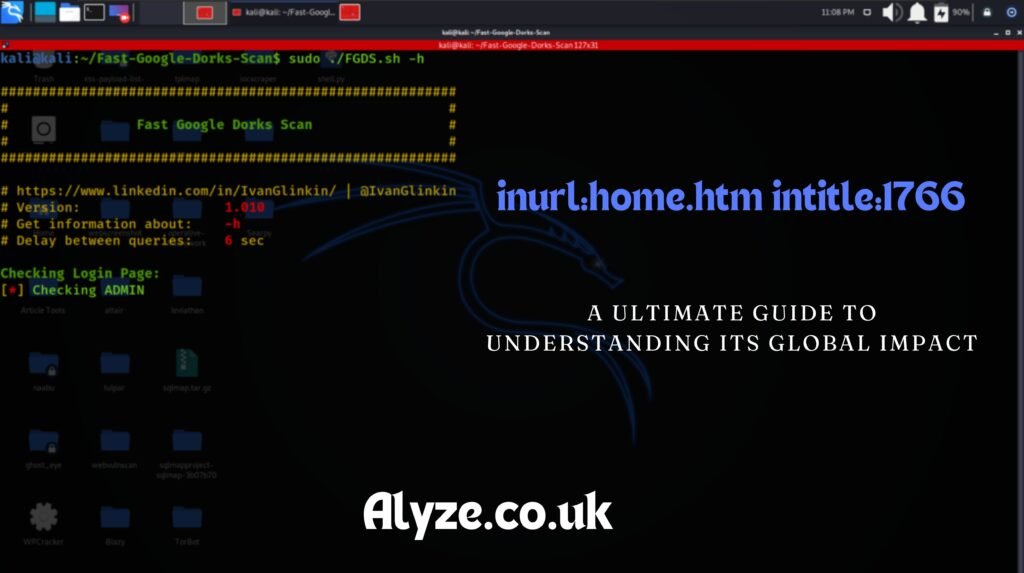Introduction
inurl:home.htm intitle:1766 : The internet is a growing dimension full of secret nooks and gems in the form of very specialized data. Of the many types of internet searches, combined searches-in this case, “inurl.htm intitle:1766”-have quite a significant importance for the webmasters, cybersecurity personnel, and technophiles. Because these kinds of strings enable searching pages and content based on extremely specific detailed queries, these are usually referred to as “Google dorks.”
In this post, we are going to look at what inurl is, how it works, and much more. Five hundred eleven .htm intitle: 1766, in respect to worldwide web searches, are going to be looked upon from such very important perspectives as security and data leak.
By the time you are through reading this post, you would have had an overview of this search phrase and how you can either use it to your advantage or protect against it.
Also Read : x3f-39t-15c-z-02l-06p-1 : The Ultimate Guide
What does inurl? : inurl:home.htm intitle:1766
.htm intitle:1766 mean? Inurl
.htm intitle:1766 is part of what was more appropriately known as “Google dorking” or “Google hacking.” These are special search operators used in finding vulnerable websites, databases which have exposure, and even sometimes unsecured files. Here’s what is done in this:
.htm in the URL: Following are some suggestions for the web page result to have the filename “home.htm” in their URL address. This type of filename can be located on a broad range of sites. It is often indicative of a home page or a welcoming/landing page.
intitle: 1766: This shows results from within web pages that contain “1766” in the title. It may be an identifier, code, and year, among others depending on context.
Power of Google Dorking
Google dorking is used by ethical hackers, researchers, and even villains to disclose sensitive information left open. Here, just as it does with inurl .htm intitle:1766, there is actually a chance that these websites are giving away-very inadvertently, mind you-very sensitive information of the sort that involves login portals, backend access points, or even unsecured data files.
How does this happen?
When the user submits inurl
For example, the search command .htm intitle:1766 would have the search engine filter only those web pages that contain both “home.htm” in the URL address and “1766” in the title. The specificity of this query reduces the number of returned results to an extremely tiny faction of pages which include older or less-secure sites that can be hacked or reveal private information.
Possible Uses and Implications
Identification of Vulnerability:
A such query would, if anything, be directed to find the places which are not well secured. Sites having open or obsolete home.htm pages can easily be accessed by the hackers or unauthorized data breaches.
Data mining:
This kind of search phrase has also been used by both researchers and security professionals in mining data across the internet for vulnerabilities. It could also be one of the ways patterns or trends, which might reveal greater systemic vulnerabilities, are found.
Discovering Historic or Niche Content:
The number “1766” in this context could refer to historic records, niche content, or even identifiers unique to a website; as such, this query will be of value in the case of an archivist or historian researching web content emanating from or about a specific period in time.
The Global Impact of inurl .htm intitle: 1766 : inurl:home.htm intitle:1766
As improbable this search keyword would sound to the average net surfer, it speaks volumes of a bullion mine to the website administrators and cybersecurity experts dotted across the globe. A few broad implications are listed below:
Website Security Threats
Webmasters often tend to be lackadaisical with either older or less important pages. Sometimes these include “home.htm.”inurl
.htmi ntitle:1766, from where hackers can find results of websites which may be keeping some sort of security weakness open. The result of this will be pages which sometimes lead to secured areas of website, or may allow the hacker to compromise data.
Data Leakage
inurl:home.htm intitle:1766 : With hundreds of websites unknowingly spilling sensitive information because of the huge amount of data online each day, many types of sensitive information such as login credentials, personal information, and private documents.
Certain queries inurl.htm intitle:1766 is a set of web pages hosting such data and gives tremendous amount of privacy and security vulnerabilities.
Ethical Hacking and Vulnerability Testing
That’s where white hat hackers and security researchers use to find vulnerable websites. Such information they get from inurl: htm intitle: 1766 queries give them the opportunity to extend courtesy to the owner of the website to be informed about potential risks and thus provide an avenue for him to take mitigating measures before malicious actors could take advantage of those vulnerabilities.
Historical Records and Archives
The term “1766” in the query would also apply contextually to a year, 1766, or catalog number associated with some documents. A word of this nature may apply to the archivists and historians who are searching through historical documents, web archives or databases referring to this period of time .
How to Safeguard Your Website : inurl:home.htm intitle:1766
A few queries like inurl
.htm intitle:1766, webmasters are doing little to ensure their website remains secure. Some of these proactive steps to take include:
Keep All Pages Current and Secured:
Periodically update and secure all web pages-even less important or ones that are rarely visited.
Clean up or Hide Inactive Files:
Pages like home.htm should either be deleted or neatly kept out of search. This will discourage hackers’ effective Google dorking in finding such pages.
Security plugins:
Utilize good security plugins to monitor against vulnerabilities, in case of a CMS for instance, WordPress.
Periodical Security Audits:
Performing periodical security audits helps to detect those pages and files that might still remain open to the public and hence need securing.
Conclusion
inurl:home.htm intitle:1766 : The inurl search query
Fairly specific, perhaps, but the .htm intitle:1766 could hold a great deal of implications within the sense of security, data exposure, and information retrieval. Website owners and users can protect their digital assets much better once they understand how Google dorking works and what such specific queries can mean in finding a vulnerability.
Such type of queries is what cybersecurity experts consider the foundation on which they base their operations of vulnerability testing and research. But this means to others that even the tiniest and insignificant-appearing digital assets are to be securely locked down so one doesn’t inadvertently allow data leaks and hack attempts.
One can minimize many types of risks with proper security in place and periodic auditing of online content about search queries like inurl. See More…



